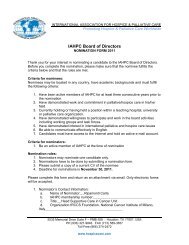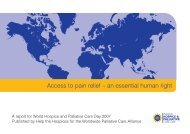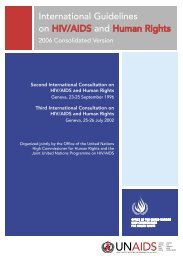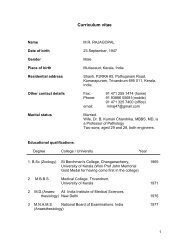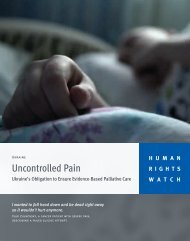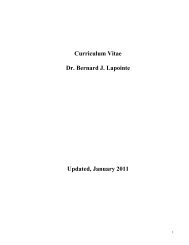INTERIGHTS Bulletin
INTERIGHTS Bulletin
INTERIGHTS Bulletin
Create successful ePaper yourself
Turn your PDF publications into a flip-book with our unique Google optimized e-Paper software.
<strong>INTERIGHTS</strong> <strong>Bulletin</strong><br />
Volume 16 Number 4 2011<br />
159<br />
migrants who are fearful of being<br />
reported to the immigration<br />
authorities if they seek to access<br />
treatment.<br />
Another serious, but unfortunately all<br />
too routine, violation of patients’ rights<br />
is described by lawyers Solomon Sacco,<br />
Allan Maleche and Omwanza Ombati:<br />
the forcible isolation of TB patients in<br />
Kenyan jails. Their case report<br />
highlights the tension that often exists<br />
between individual rights and wider<br />
public health concerns. However,<br />
whilst recognising the serious<br />
challenge posed by drug-resistant TB,<br />
particularly in Africa with high levels<br />
of HIV infection and low levels of state<br />
spending on health, the authors argue<br />
that the approach adopted by the<br />
Kenyan government is<br />
disproportionate and out of step with<br />
global best practice. Although isolation<br />
may be required to prevent the spread<br />
of the disease and there is a need to<br />
monitor and ensure that patients take<br />
the appropriate medicines, this should<br />
be done within a healthcare setting and<br />
not through the use of prisons. In such<br />
circumstances extra vigilance is<br />
required with human rights dictating,<br />
and not being subservient to, public<br />
health policy.<br />
In their article on harm reduction<br />
Damon Barrett and Patrick Gallahue<br />
from Harm Reduction International<br />
begin by explaining that, whilst the<br />
concept may be unfamiliar to many<br />
working in the human rights field, it<br />
has a solid basis in many fundamental<br />
rights principles such as dignity,<br />
universality,<br />
transparency,<br />
accountability and participation. By<br />
definition, harm reduction focuses on<br />
reducing the harms associated with<br />
drugs and their use, requiring the<br />
active participation of patients based<br />
on genuine consultation and the<br />
provision of objective information.<br />
However, as Barrett and Gallahue<br />
point out, harm reduction only works<br />
if it is not supplanted by the use of<br />
draconian and punitive measures.<br />
Clearly, the issue is particularly stark in<br />
custodial settings, where<br />
disproportionately high levels of drug<br />
use and HIV combined with lack of<br />
access to appropriate harm reduction<br />
based treatment result in users being<br />
placed at risk of, at the very least, cruel,<br />
inhuman or degrading treatment or<br />
punishment. In some jurisdictions the<br />
problem is exacerbated by the use of<br />
forcible treatment centres run not by<br />
trained medical staff but by security<br />
and military personnel. Abuses,<br />
including severe beatings, sexual<br />
violence, forced labour and other<br />
forms of torture have been widely<br />
documented. Another completely<br />
unacceptable judicially-sanctioned<br />
measure is the use of corporal<br />
punishment for drug use, purchase or<br />
possession, representing everything,<br />
as Barret and Gallahue point out, that<br />
harm reduction opposes.<br />
The powerlessness and multiple forms<br />
of discrimination experienced by<br />
women and girls in society often<br />
translates into them bearing a<br />
disproportionate burden when it<br />
comes to suffering abuses in<br />
healthcare settings. This is powerfully<br />
brought out in Elisa Slattery’s article in<br />
the context of sexual and reproductive<br />
health services.<br />
However, at the same time Slattery,<br />
who works for the Center for<br />
Reproductive Rights, highlights that<br />
the increasing body of case law on<br />
reproductive rights such as forced<br />
sterilisation and abortion is not only<br />
playing a significant role in advancing<br />
gender health rights; it is also having a<br />
wider impact on litigation of health<br />
issues more generally, both in terms of<br />
the procedural issues – complex<br />
medical fact patterns, time-sensitivity –<br />
and fundamental principles such as<br />
progressive realisation of the right to<br />
health and preventing discrimination<br />
and torture or cruel, inhuman and<br />
degrading treatment.<br />
The article goes on to examine several<br />
recent landmark cases from regional<br />
and international human rights bodies<br />
on maternal mortality and abortion<br />
which, as well as addressing violations<br />
of reproductive rights, have<br />
contributed more broadly to<br />
strengthening the human rights and<br />
accountability framework around<br />
violations in healthcare settings.<br />
Denial of pain treatment affects<br />
millions of people worldwide and yet it<br />
could be one of the most easily<br />
rectified problems. As Diederik<br />
Lohman and Joseph Amon from<br />
Human Rights Watch point out, the<br />
severe pain suffered by millions of<br />
people, including 5.5 million terminal<br />
cancer patients, could be prevented<br />
through the provision of relatively<br />
cheap, safe and highly effective drugs<br />
such as morphine. Yet these types of<br />
medication are virtually unavailable in<br />
more than 150 countries due to overly<br />
restrictive drug regulations and/or lack<br />
of knowledge amongst medical staff<br />
about prescribing them.<br />
Lohman and Amon argue that not only<br />
does such a systemic failure breach a<br />
state’s right-to-health obligations but<br />
also constitutes a violation of the<br />
prohibition of torture, cruel, inhuman<br />
or degrading treatment. Denial of pain<br />
treatment clearly fulfils the minimum<br />
requirements for suffering – both<br />
physical and mental – but there is a<br />
comprehensive failure of states to fulfil<br />
positive obligations including to<br />
adequately respond to complaints and<br />
to ensure the availability and<br />
accessibility of pain treatment for all<br />
those who need it. At a minimum this<br />
involves the drawing up and<br />
implementation of appropriate<br />
national action plans and policies<br />
together with the training of medical<br />
personnel.<br />
Yet, beyond the recommendations of<br />
international and regional monitoring<br />
bodies on this issue, it is the case study<br />
of a Ukrainian patient which brings<br />
home powerfully the reality of the<br />
issue for millions of victims. Oleg<br />
Malinovsky and the millions of other<br />
patients worldwide who are failed by<br />
their health systems deserve better: a<br />
right not just to appropriate health care<br />
but to be treated with humanity and<br />
dignity.<br />
Iain Byrne is ESCR Policy Coordinator<br />
at Amnesty International



